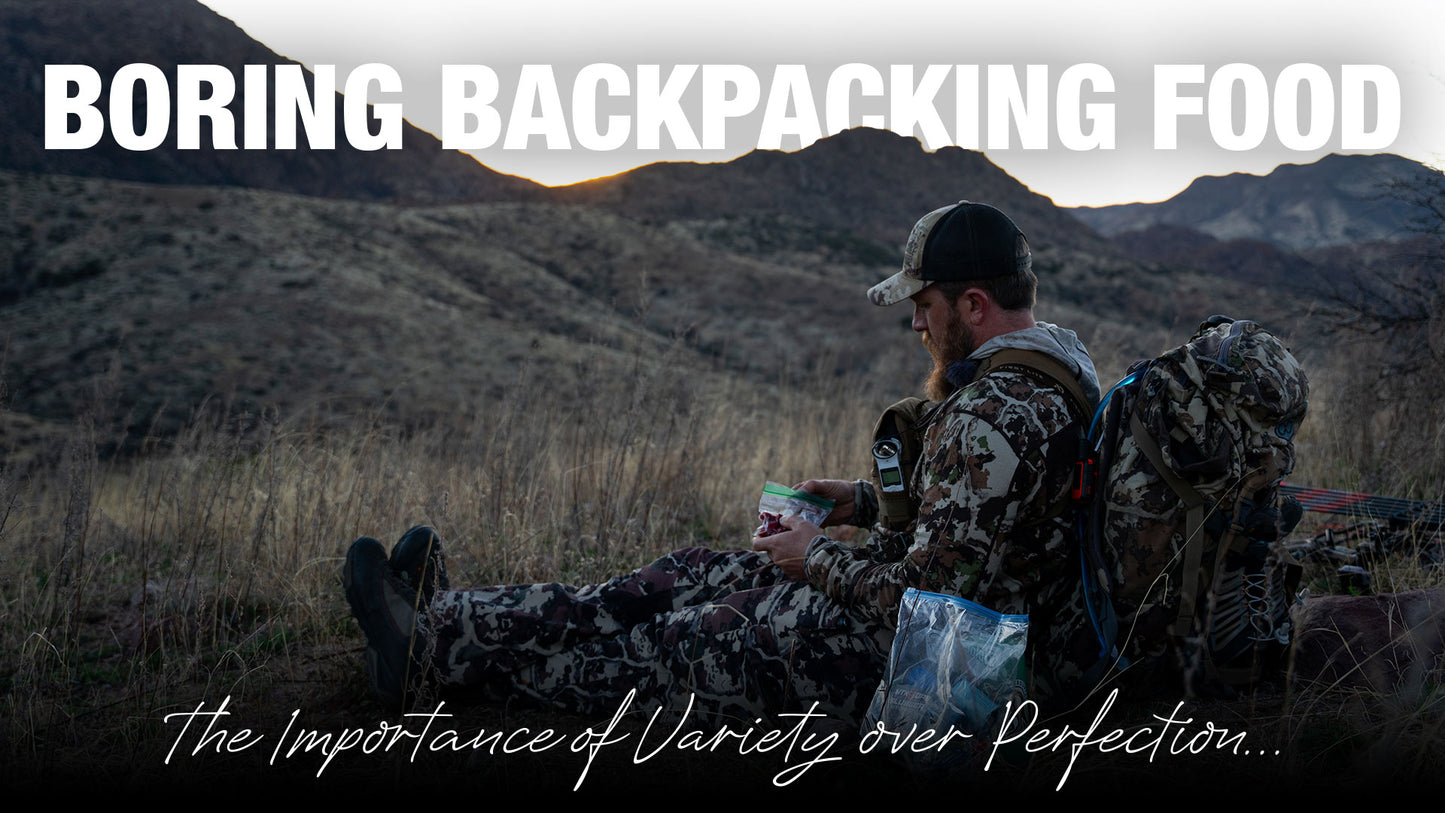
The fine line between gram-counting calories and the “food is fuel” mentality can be razor thin. Plenty of words have been dedicated to the importance of backcountry nutrition, so this article doesn’t need to exhaustively cover the risks of not fueling your body enough back there. (We already have a free guide for that.) Improperly planning your nutrition will lead to less energy, reduced cognitive function, and other risks that can absolutely ruin a hunt, so it is imperative that we plan an adequate diet for our backcountry adventures.
If we only pack the right amount of calories or the perfect balance of macros and don’t consider the psychological impact of food, we will leave ourselves vulnerable to a problem where we have the calories we need in our packs, but can’t actually consume the foods as we should.
I learned this the hard way last fall on a weeklong backcountry hunt for high country mule deer. I perfected my food plan before the trip, even using the MyFitnessPal app to make sure my calories and macros were perfect. I dutifully set about assembling each day’s gallon ziplocks with exactly what my body was going to need for that day.
The first couple days went great, and I felt like I had energy to spare as we stalked some of the biggest bucks I’ve ever seen in the wild. But somewhere around breakfast on day three, things took a turn. I first noticed a problem with the protein oatmeal I had personally mixed for each morning. This meal had lost its appeal and I had to force myself to choke it down between long sips of coffee. Hours later, the bars I had brought along started to sound gross and I didn’t want anything to do with them. Even the candy I brought for quick energy didn’t seem all that great by the end of the week. If you don’t want to eat candy anymore, something has gone seriously wrong. As the week went on, I noticed an increase in the leftover food in my bag at the end of each day. My energy, morale, and desire to keep going on stalks declined at roughly the same rate.

THE BACKCOUNTRY IS MENTALLY TAXING
Everyone knows that backcountry hunting takes a physical toll, which is why we pay attention to our nutrition in the first place. But I believe we often underestimate just how difficult backcountry hunting can be on our minds. Everything in the backcountry is more difficult, and our brains devote a ton of energy not just to the hunt, but to basic survival while in the wilderness. Although a little suffering is good and helps make us stronger, it also puts us in a more vulnerable mental state.
When you’re depleted mentally, you’re more prone to experience negative emotions or a downturn in morale. Even if the hunt is going well and you’re surrounded by good friends and beautiful scenery, your brain can still turn on you when it is worn-down by working extra hard for every single thing throughout the day. But the beautiful thing about our brains is they can also be snapped back to a more positive state through some of the simplest things. A little sugar or the right combination of fat and salt and suddenly we’re loving life and re-energized for the hunt. I can’t tell you how many 14-hour glassing days have been saved by a bag of Sour-Patch-Kids when there’s only an hour of light left and I just haven’t seen what I’m looking for.
So, not only should you make sure your pack is full of food you like, but some variety and mini-surprises will do wonders for rescuing your morale. I now try to take enough variety of food into the backcountry that when I pull the day’s food out of the tree in the morning, I get to peer inside and say, “Yes! I have (insert treat of choice) today!” If there’s at least an item or two that you didn’t have the day before and you’re really looking forward to, it’ll help keep your spirits up as the hunt gets long.

TRICK-OR-TREAT ON EVERY HUNT
Remember when you were a kid on Halloween and you and your friends would come back from a night of trick-or-treating, dump everything on the floor, and start trading candy with each other? Well, I’m a firm believer that this same process is a necessary part of an awesome hunt. Obviously, if you’re hunting solo, this is a moot point (unless of course you can find a stranger on the trail willing to trade, in which case I’d love to hear that story).
No matter how much variety you try to build into your food system, there will simply be things you didn’t think of or stuff you didn’t bring. If you’re sharing your hunt with friends, they almost certainly approach their food with a different mindset, different go-to snacks, or even just shopping at a different store. If you can sit on the side of a mountain during that midday lull and start bartering with your food, it’ll create even further variety in your day and simultaneously boost the morale of your whole camp.
I remember trading a PayDay candy bar that I just couldn’t bring myself to eat (having had one the last four days) for some jerky. Now, I have a pretty significant sweet tooth and PayDays are one of my favorite candy bars, but that day getting rid of it changed the entire outlook for both myself and my buddy. I think he’s had PayDays in his food bag every hunt since then, and I took note of the awesome brand of jerky I hadn’t tried before that he shared with me. This is such a simple (and seemingly juvenile) practice, but it can make a surprising amount of difference in the mental game of grinding out a long backcountry hunt.
DON’T CUT CORNERS
I try to keep a close eye on ounces and dollars when I’m preparing for a hunt. It’s no secret that both of those categories can spiral out of control pretty quickly, and I try to be as conservative as possible with each of them. But I have learned that if there’s one place to give a little more flexibility for weight and cost, it’s food. Some of my favorite backcountry food is a bit more expensive (ProBars anyone?) and might not be the lightest option for the calories offered, but I believe it’s totally worth it. I remember one of my first big backcountry adventures, I brought ramen and packets of chicken for lunch every day. Well, that cheap and weight-saving meal was gross on day-one, so it was completely indelible by day-four.
I’ve heard of guys who get their food dialed down to about 1.5 lbs per day, and I just can’t get there. It seems that if I’m going to have enough calories and have them be calories I’ll want to eat, it’s going to be at that 2 lb mark (and maybe even go a couple ounces over that). And while yes, ounces equal pounds and pounds equal pain, starving or hating life back there is way more painful than a couple extra pounds on your back on the way in. Plus, you have to consider this is weight that won’t be coming out with you, so you only have to haul it once.
When it comes to the budgetary side, I obviously can’t speak for your particular financial situation. I will say, however, that if you can swing an extra few dollars to buy items you really like, or get the name-brand stuff that tastes way better than the off-brand stuff (like that horrendous chicken I tried to bring), you won’t be sorry.

REMEMBER, THIS IS SUPPOSED TO BE FUN
As backcountry hunters, sometimes we glorify the suck of it all. We’re just weird enough to love when things are difficult and enjoy the process of pushing ourselves to the limit. And while a little grinding every now and then is par for the course, and a great way to develop grit as a hunter, this is also supposed to be fun. You’ve devoted time, money, and vacation days to being out there — you should enjoy yourself a little! Don’t make something as preventable as not having the right food cause the hunt to be more difficult or miserable than it needs to be. Have some child-like foods and child-like fun out there!
There are plenty of obstacles that the weather, terrain, and animals are already going to throw at you, so make your daily food bag a reliable source of comfort back there.
Favorite Foods & Snacks from the Exo Crew
Looking to add some variety to your pack for your next hunt? Here are some of the favorites from the team at Exo Mtn Gear...
- The Best Bars — Big Sur Bar, Backcountry Bar, Bobos Bars
- Chewy Candies — Albanese Gummy Bears, Haribo Gummies, Sourpatch Kids, Hi-Chews
- Chocolate Candies — Snickers, Midnight Milky Way, Twix, or whatever you can steal from your kids
- Other Sweets — Golden Graham Cereal Bars, Pop-Tarts, Honey Stinger Waffles
- Nuts & Nut Butters — Nature Valley Nut Butter Biscuits, Clif Nut Butter Bars, Justin's Nut Butter Packets, different varieties of Trail Mixes
- Fruity — Nature's Bakery Fig Bars, Dehydrated Fruit (Bananas or Apples) mixed with Granola
- Warm Night Cap — Apple Cider packets, Hot Cocoa packets, Lapsang Souchong Tea
Eric Voris is a passionate adult-onset hunter, the author of How to Hunt: A Total Beginner's Guide to Hunting Big Game, and the creator behind Late to the Game Outdoors. He is an accomplished writer, filmmaker, and content creator in the outdoors space, and spends his time chasing animals across the West. Eric lives in Arizona with his wife and three kids, dodging rattlesnakes and hunting together whenever possible.
